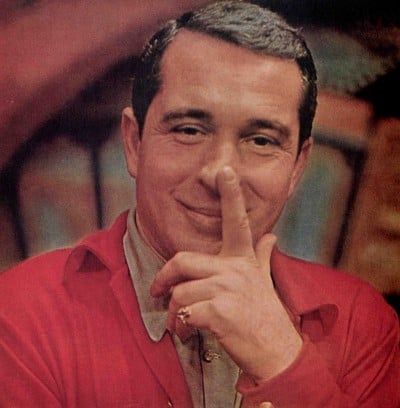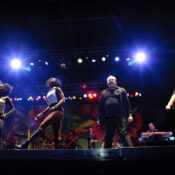I said, “I heard Patti Page say of you, ‘No one is going to make him over,” Has anyone ever tried to make you over?”
“There are always people trying.” he said. “I’ll never forget one of the first times. It was when I started in this business. I walked out on the stage of the Paramount Theater in New York to play the first theater date I’d ever done as a solo, and I was scared silly.
“Every time I walked on or off, somebody told me, ‘You’ve got to learn how to walk out there. You’re supposed to be alive, not a sleepwalker. Come out showing some pep.’ I was just being myself and I was no jolly boy, jumping out there before the footlights, smiling broadly. For one thing, there was nothing to smile about. So all their advice went in one ear and out the other. If I felt like walking out lazily and quietly, I did. If I felt like walking a little more happily, I did that too. It all depended on the feeling I got from the audience when I poked my nose around the corner of the proscenium arch. Sometimes I thought the people out front didn’t want to hear me, so I didn’t feel like singing at all.”
I asked. “What did you do when that happened?”
“I’d sing a couple and walk off. I had that experience occasionally at the Copacabana. Putting a punk like me, who has always had an orchestra working behind him, into the Copa, that was pretty cruel, I died a little every show. I asked myself, What am I doing here? They don’t want me, realty.”
“You mean it was that obvious?”
“Sure it was that obvious,” Como said. “They didn’t know who I was. I was just an ex-band singer.” He remembered something, and his eyes warmed at the thought. “Jack Entratter, who owned the joint, was very thoughtful and very helpful to me. If the crowd got too noisy, he’d get up there and say, ‘Shadd-aup!’ Even then, I was still scared. I was especially frightened of the dinner shows, where there’d be two guys a little drunk who wanted to talk to each other about selling washing machines or automobiles, and all my singing did was annoy them.”
“How do you sing to people like that?” I asked.
“You sing through them,” Como explained.
“You tune up the P.A. system very loud. In my case, if that wasn’t enough. I’d just sing a couple of songs and very politely go away. But in the end, although the Copa was bad at first, I stayed there thirteen weeks. I started to record a little. A couple of my records started to mean something, and I picked up a little confidence.”
“Successful records mean a lot to a singer, don’t they?” I said.
“Naturally,” he agreed. “When I first came to New York, night-club-goers didn’t know who I was. If they knew anything, they knew I had just come out of a barbershop by way of a territory band, which Ted Weems’s band was.”
“What territory?” I asked.
“Chicago and the Middle West,” he said. “On the whole, it was a scarifying experience, and I think that that’s behind my not wanting to work the clubs now. Also, if I have anything to sell, I’d like to sell to as many people as possible—and that means television. I see nothing attractive in stepping out before a hundred and fifty people who may be a little high and a little noisy. And when I played theaters, I was in them from eight o’clock in the morning until midnight, doing as many as seven shows a day.”
I said, “I didn’t know anybody ever did that many.”
“You’re looking at a character who did,” he told me. “During my last theater tour ten years ago, I worked New York, Chicago, Boston and Philadelphia. My first show in Chicago went on at eight-fifteen in the morning. Can you imagine looking romantic at eight-fifteen A.M.?”
I didn’t say so, but it occurred to me that he must have been remarkably popular for people to get up that early to hear him.
“Nevertheless, that grind had its compensations,” he went on. “I was being paid on a percentage basis, and I guess there were times when I picked up twenty to twenty-five thousand a week. The only reason I didn’t do eight shows a day was that the motion picture between shows was so long. It was in Chicago that I got to know a man I admire very much—Nate Platt, house manager of the Chicago Theater. Nate is one of the sweetest people I’ve ever known, although his tongue is as rough as a blacksmith’s file. When I was getting ready to leave, he didn’t say a word; he just shoved a thousand-dollar bonus into my hands. It knocked me out—for, after all, I’d taken plenty out of his till without this extra.
“I looked at this man, and all I could say was, ‘I don’t believe It.’ He seemed embarrassed. He said, ‘You dago so-and-so, you’re all right.’ That’s the way he talked. I’ll never forget the first show I did for him. I had an abscessed tooth, I had had to get up at seven so a dentist could put a drill through it. Anyway, I’m up there on the stage doing the day’s first show, and my jaw is out to there. I’m in real bad shape. I hadn’t been able to eat. I hadn’t slept. I looked eighty years old. He walked in and stood there—I didn’t know who he was—and he said, ‘For heaven’s sake, can’t you sing a little faster?’ I looked back at him and said, ‘Why don’t you get the hell out of here!’ and I wanted to kill him.
“He said, ‘I manage this theater, and we’ve got to get people in and out of here. We have to have a certain turnover, you know, but you sing so slow we’ll never make it—never in this world.’
“That was my introduction to him. It took me two days to find out how kind he really was and how soft he was under his roughness. He’d bring me my lunch, throw it down and say, “Eat that, you bum.’ He really mothered me. Ever since then, we’ve been very dear friends; and every time I’m anywhere near him, I call, and we have a cup of coffee.
“Several years ago when I was in his town I went to see Nate. He didn’t even say ‘hello.’ He just said, ‘Come with me.’ And he took me backstage where Billy Eckstine was singing, ‘O-o-o-o-olllllddddd man river!’ He said, ‘I wanted you to see one such and such who sings slower than you do. I could run two pictures in the time it takes him to get through one chorus!'”
Become a Saturday Evening Post member and enjoy unlimited access. Subscribe now




Comments
A very nice article.I am sad that Perry Como is so underrated.Not producing scandals ,headlines in the tabloids and showing of is obviously the way to get forgotten.
Best regards
G.Bendel
Germany
Wonderful article. I remember listening to Perry on the radio with my Mother. I have many of his records.